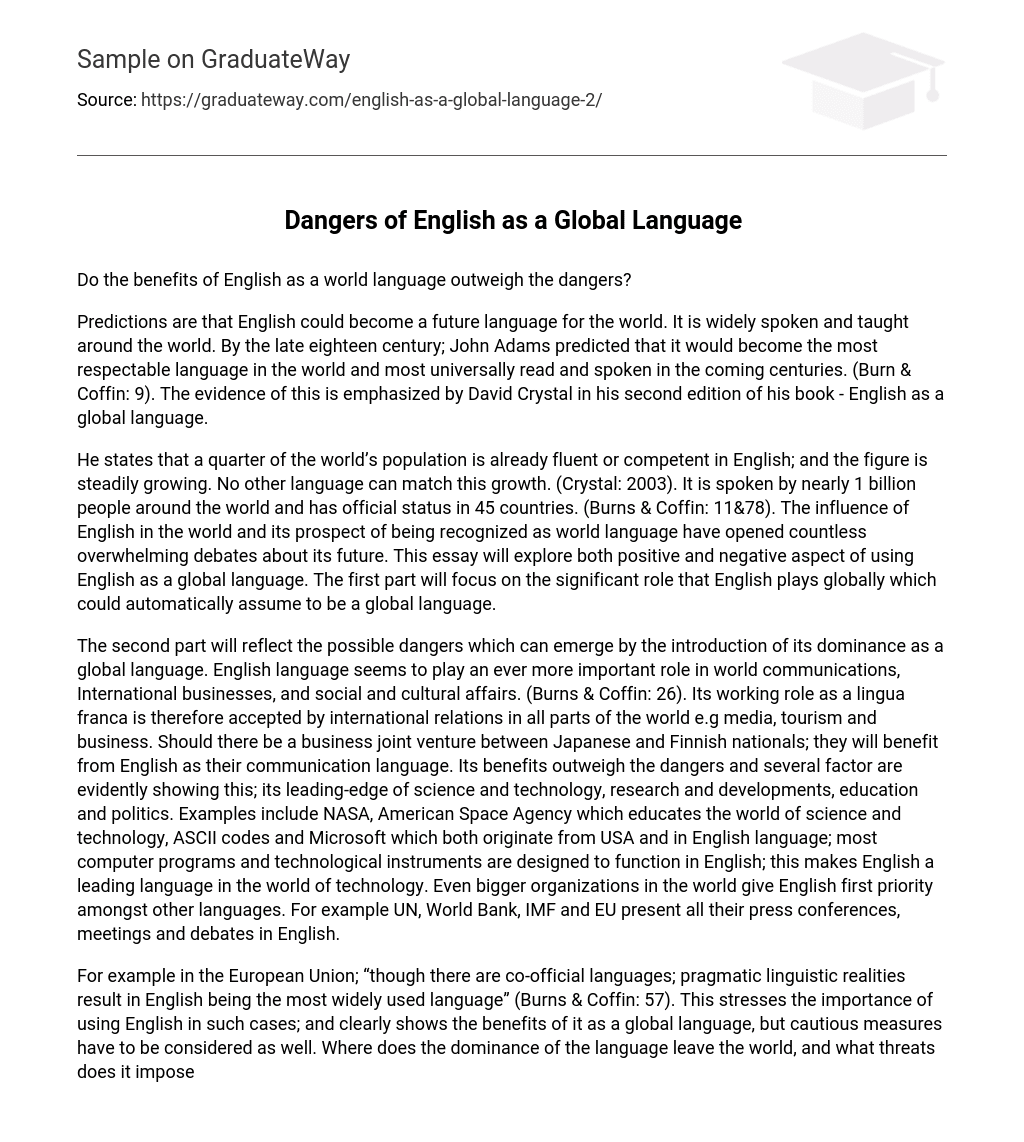Do the benefits of English as a world language outweigh the dangers?
Predictions are that English could become a future language for the world. It is widely spoken and taught around the world. By the late eighteen century; John Adams predicted that it would become the most respectable language in the world and most universally read and spoken in the coming centuries. (Burn & Coffin: 9). The evidence of this is emphasized by David Crystal in his second edition of his book – English as a global language.
He states that a quarter of the world’s population is already fluent or competent in English; and the figure is steadily growing. No other language can match this growth. (Crystal: 2003). It is spoken by nearly 1 billion people around the world and has official status in 45 countries. (Burns & Coffin: 11&78). The influence of English in the world and its prospect of being recognized as world language have opened countless overwhelming debates about its future. This essay will explore both positive and negative aspect of using English as a global language. The first part will focus on the significant role that English plays globally which could automatically assume to be a global language.
The second part will reflect the possible dangers which can emerge by the introduction of its dominance as a global language. English language seems to play an ever more important role in world communications, International businesses, and social and cultural affairs. (Burns & Coffin: 26). Its working role as a lingua franca is therefore accepted by international relations in all parts of the world e.g media, tourism and business. Should there be a business joint venture between Japanese and Finnish nationals; they will benefit from English as their communication language. Its benefits outweigh the dangers and several factor are evidently showing this; its leading-edge of science and technology, research and developments, education and politics. Examples include NASA, American Space Agency which educates the world of science and technology, ASCII codes and Microsoft which both originate from USA and in English language; most computer programs and technological instruments are designed to function in English; this makes English a leading language in the world of technology. Even bigger organizations in the world give English first priority amongst other languages. For example UN, World Bank, IMF and EU present all their press conferences, meetings and debates in English.
For example in the European Union; “though there are co-official languages; pragmatic linguistic realities result in English being the most widely used language” (Burns & Coffin: 57). This stresses the importance of using English in such cases; and clearly shows the benefits of it as a global language, but cautious measures have to be considered as well. Where does the dominance of the language leave the world, and what threats does it imposes to the non speaking nations? Negative cultural diversity is one of harmful effects that it could bring to other nations. Regardless of its dominance and benefits in the global context; there are however the dangers that can be caused by any global language. There are more than 193 nationals in the world (United Nation), and each values its culture and identity. Thus intruding into their cultural identities by introducing a global language would be discriminative and insolent.
Good example of this can be seen in multi ethnic countries where every ethnic group values its language because it represents who they are. Any global language introduced to these societies could result in confusion which might lead to conflicts. These minority groups will feel culturally invaded as they would be robbed their values and identities. In his book Sociolinguistics; Peter Trudgill also emphasizes the closeness of language and culture by stating that there is an intimate between two. Apart from cultural invasion there are other dangers of global language such as political and economical instability to the non-native nations as they will struggle to assimilate into the new world of English; giving the native speakers advantage and effective way of using the language. Financially dominating countries like China and Japan could suffer setbacks as societies would react negatively to the new monolingual world; which could lead to slow economical growth and this can results a major setback; not only to particular countries but to the whole world. Multilingual and rainbow cultures are what makes the world and bring people together.
Learning and speaking other languages other than English is essential for personal and social development. The introduction of a global language could make people lazy about learning other languages; and relying only on one language. “The ultimate threat – can make all other languages unnecessary” (Crystal: 2003). As a result English is beneficial language of science and technology, education, politics and commercial. It is also gate opener to many career and business paths; however its significant role does not label it as a “global language”. It is still essential that each language should be considered and respected to maintain linguistic balance as everyone has their mother tongue and they are proud of it. In facts there is no need for a global language as there are translators worldwide. References
Burn and Coffin 2001. Analyzing English in a Global Context Crystal 2003. English as a Global language
www.un.org/en/ga





